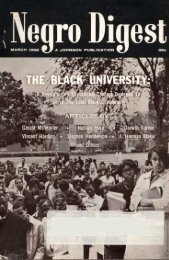3. Strain, Christopher Barry. “Civil Rights and ... - Freedom Archives
3. Strain, Christopher Barry. “Civil Rights and ... - Freedom Archives
3. Strain, Christopher Barry. “Civil Rights and ... - Freedom Archives
Create successful ePaper yourself
Turn your PDF publications into a flip-book with our unique Google optimized e-Paper software.
Deacon chapters resulted from parallel buildups in Klan strength <strong>and</strong> activity in those<br />
areas~° The organization mobilized later that month in Mississippi locales : Natchez,<br />
Grcenville, Columbia, <strong>and</strong> Jackson, where Charles Sims led a ten-man delegation invited<br />
to discuss the possibility of organizing there . Sims told a crowd of throe hundred black<br />
men at the Negro Masonic Hall on Lynch Street : "It is time for you men in Jackson to<br />
wake up <strong>and</strong> be men ." Sims claimed he had been "shot five times <strong>and</strong> shot at about ten,"<br />
<strong>and</strong> he was not afraid to come to Jackson 4~<br />
Sexist language often shaped the burgeoning debate over the place of guns in the<br />
movement, as well as the ongoing argument concerning self-defense, <strong>and</strong> Sims' rhetoric<br />
reflected this trend. The original chapter in Jonesboro included women in its ranks,2 ;<br />
however, subsequent chapters of Deacons excluded women from their male-only clubs .<br />
The Deacons became, in many ways, an expression of manhood .4 ~ "Everything we<br />
l4, 1965) : 13 . Auxiliary groups, such as the Austin group <strong>and</strong>, later, the "Friends of the<br />
Deacons" in New York City, cropped up outside the South . See "Deacons Organiu<br />
Chicago Chapter," New York Times (April 6, 1966) : 29 .<br />
4°Limmerman, "Race <strong>and</strong> Violence," The Wall Street Journal (July 12, 1965): 1 .<br />
4~Sims, quoted in Roy Reed, "Deacons, in Mississippi Visits, implore Negroes 'to<br />
Wake Up,"' New York Times (August 30, 1965) : ? .<br />
42Akinyele Umoja has rcseaahed the role of women in the Deacons. See Umoja,<br />
"Eye for an Eye : The Role of Armed Resistance in the Mississippi <strong>Freedom</strong> Movement"<br />
(Plt. D . diss ., Emory University, 1996), 188 .<br />
`3Some form of chauvinism often characterized discussion of self-defense within the<br />
movement . Self-defense became a function of manhood. For example, Bishop Charles<br />
Eubank Tucker blessed marchers in 1966 <strong>and</strong> re-assured, "Any Negro or white has the<br />
right to defend himself with arms . Any man who didn't ought to take off his pants <strong>and</strong><br />
wear skirts." See "Marchers Upset by Apathy," New York Times (June 14, 1966) : 19 .<br />
The Deacons, too, used similar language . "It's time for black men," Ernest Thomas<br />
12 8
















